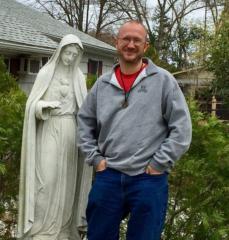Jan 27 • General discussion
Pre-Chapter Conversation w Lay Marists & Brothers
On Sunday, January 26, the Provincial Council of the USA Province had a pre-Chapter “Conversation in the Spirit” with eight laypeople in Lawrence, MA. Most were formally committed Lay Marists of Champagnat, and most were also present or former colleagues at our school in the local area. The following are significant outcomes that emerged:
*The communion of Marist Brothers and Lay Marists together as Marists of Champagnat has become an essential and significant aspect of our Province identity and a major force in shaping future directions. It has renewed us as a Province and given new life to individual Brothers in particular who have found new energy and purpose in accompanying Lay Marist adults. This has been the result of an intentional commitment which needs to continue.
*There is great richness in the present opportunities for people to continue their growth in the charism throughout different life stages from Marist Youth to Marist Young Adult to Marist Young Professional, etc. with support structures to help people engage with Marist community at each stage.
*The charism has become more inclusive over the years; even considering when many of our ministries went from single-sex to co-ed; it is clear that in our religious experience as Marists there is no room to exclude anybody.
*We are being called to be a Marian Church, to see the world with Mary’s heart. This is attractive to many people who long for closeness to God but cannot find a comfortable home within the institutional Church that typically presents itself. Mary is both our focus but also our guide.
*More and more, we are seeing our Marist community and presence expand beyond our schools and into how people choose to live their daily lives as they follow Christ in the world.
*Many people, especially young people, are hungering for connection. That is one opportunity that many find with us. People desire to be respected for who they are.
*There has been an evolution of our consciousness from “Marist Brothers Schools” to Marist Schools” in a way that continues to grow inclusivity.
*We need to always remember our need to serve the economically poor; it is easy for Catholic schools to serve the elite. How do we ensure that our mission continues to serve those on the margins? How do we practically build the financial structures that allow us to sustain this crucial aspect of our mission?
4
0 comments

skool.com/maristaschapter2025
Join the 23rd General Chapter in Tagaytay. A platform for Marists to engage, share insights, and shape the future together.
Powered by

